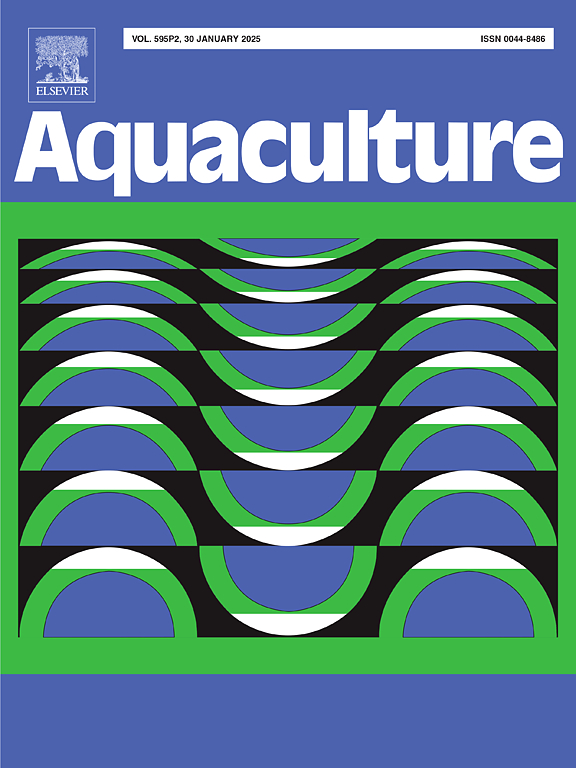用于现场检测白斑综合征病毒(WSSV)的便携式 DNA 提取和环介导等温扩增(LAMP)
IF 3.9
1区 农林科学
Q1 FISHERIES
引用次数: 0
摘要
过去三十年来,白斑病(WSD)一直是全球对虾产业面临的最严重、最致命的威胁。白斑病由白斑综合症病毒(WSSV)引起,会给对虾养殖造成严重的经济损失。该病可在 3-10 天内造成 90-100% 的快速和大量死亡。目前,还没有有效的治疗措施来控制 WSD。严格的生物安全、可能的淘汰和早期诊断可以防止病原体的传播。一些先进的诊断方法已经标准化,可用于早期快速检测 WSD。但是,可在实地部署的诊断方法还很有限。LAMP 是一种具有成本效益的核酸扩增替代方法,可在等温条件下操作。本研究开发了一种新型野外便携式 LAMP,用于诊断 WSSV。WSSV 扩增在 65 °C 等温条件下进行了优化,反应时间为 55 分钟。在这种密闭试管扩增过程中,肉眼可通过观察简单的颜色变化轻松看到最终结果。这种检测方法灵敏度高,可检测到多达 6 个拷贝的 WSSV 质粒 DNA 和 0.1 fg 的 WSSV 基因组 DNA。此外,这种诊断方法具有高度特异性,不会与其他对虾病原体(如 IHHNV、IMNV、EHP 和副溶血性弧菌)或凡纳滨对虾、单孔对虾和 indicus 对虾的宿主 DNA 发生交叉反应。此外,现场可部署 DNA(FDD)提取方法已经标准化,只需一个简单的转子和干浴。这种可视化 LAMP 耦合 FDD 提取不需要任何复杂的设备或专业技术。因此,这种可靠的 LAMP 检测方法可用于 WSD 的常规监测、护理点检测、早期检测和及时干预。本文章由计算机程序翻译,如有差异,请以英文原文为准。
Portable DNA extraction and loop-mediated isothermal amplification (LAMP) for the on-site detection of white spot syndrome virus (WSSV)
White spot disease (WSD) has been the most severe and lethal threat to the global shrimp industry for the past three decades. WSD caused by white spot syndrome virus (WSSV) can result in severe economic losses in shrimp culture. The disease can cause rapid and mass mortality of 90–100 % within 3–10 days. Currently, there are no effective treatment measures available for the control of WSD. Strict biosecurity, possible elimination, and early diagnosis can prevent the spread of the pathogen. Several advanced diagnostic methods have been standardised for the early and rapid detection of WSD. However, the field deployable diagnostic methods are limited. LAMP is a cost-effective, alternative nucleic acid amplification method that operates under isothermal conditions. In this study, a novel field-portable LAMP was developed for the diagnosis of WSSV. The WSSV amplification was optimized at an isothermal condition of 65 °C and a reaction time of 55 min. In this closed-tube amplification, the end results were easily visualized with the naked eye by observing the simple color change. This assay is highly sensitive and can detect up to 6 copies of WSSV plasmid DNA and 0.1 fg of WSSV genomic DNA. Additionally, this diagnostic method is highly specific and did not cross-react with other shrimp pathogens such as IHHNV, IMNV, EHP and Vibrio parahaemolyticus or host DNA of Penaeus vannamei, P. monodon, and P. indicus. Furthermore, a field-deployable DNA (FDD) extraction method has been standardised with a simple rotor and dry bath. This visual LAMP-coupled FDD extraction did not require any sophisticated equipment or technical expertise. Thus this robust LAMP assay can potentially be used for routine surveillance, point-of-care testing, early detection, and timely intervention of WSD.
求助全文
通过发布文献求助,成功后即可免费获取论文全文。
去求助
来源期刊

Aquaculture
农林科学-海洋与淡水生物学
CiteScore
8.60
自引率
17.80%
发文量
1246
审稿时长
56 days
期刊介绍:
Aquaculture is an international journal for the exploration, improvement and management of all freshwater and marine food resources. It publishes novel and innovative research of world-wide interest on farming of aquatic organisms, which includes finfish, mollusks, crustaceans and aquatic plants for human consumption. Research on ornamentals is not a focus of the Journal. Aquaculture only publishes papers with a clear relevance to improving aquaculture practices or a potential application.
 求助内容:
求助内容: 应助结果提醒方式:
应助结果提醒方式:


